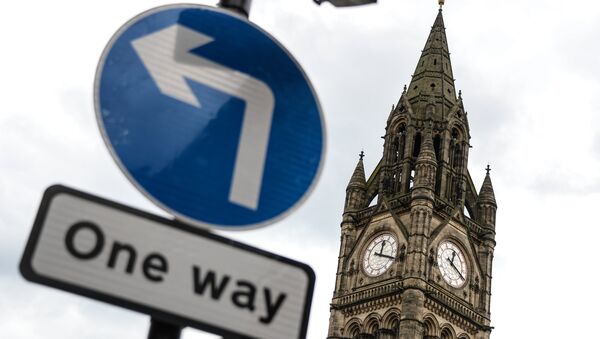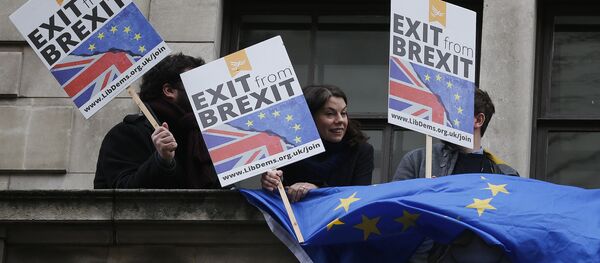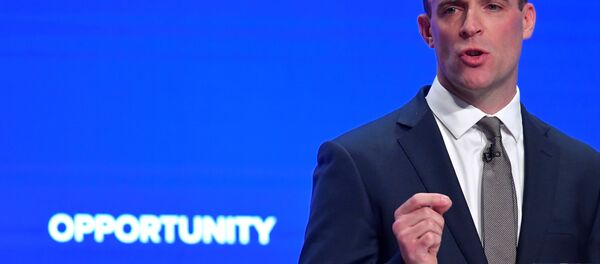Radio Sputnik discussed Boris Johnson's alternative for Theresa May's proposals with Rodney Atkinson, founder of the website freenations.net, one of Britain's most successful political economists and a former advisor to ministers.
Sputnik: How would you assess Boris Johnson's alternative for Theresa May's proposals? Could it work out now that the clock for the UK is ticking and would Mrs. May consent to them?
But there's one part to it which seems to me a bit confused and that is where he says that we would agree on an exit fee on leaving and then there would be an agreement and the intention to negotiate a Canada-style free trade agreement. Of course, that is the wrong way around; we couldn't do it that way because they would take our money and in the end, we wouldn't get a trade deal.
So, obviously, the commitment must be to finalize a trade deal and then the exit fee would be paid. But apart from that, it is a refreshing change.
READ MORE: Anti-Brexit Protest: People March in Birmingham Amid Tory Conference (PHOTO)
Sputnik: There is a six-point plan that he has outlined; I believe that there is also something about resolving the issue with Ireland. What can you say about the Irish border issue?
Rodney Atkinson: There's no doubt there're solutions. I mean, at the moment there is an Irish border, there are checks of various kinds and there are big differences between the North and the South in terms of taxation and duties, income tax, VAT rates and so on. There're lots of differences and we manage perfectly well without a specific border post with gendarmerie of any sort.
And also nowadays trade is conducted through trade facilitation agreements, which make it a lot easier with modern technology not to have to check trade at the border. So, there's no problem there. Indeed, at various times both the Irish and the British inland revenues have pointed out that it shouldn't be necessary to have a hard borer.
Recently, I think, Barnier himself has said that he's going to make more proposals to make that possible. Of course, the Irish would want the European Union to make the border as clear and open as possible. I don't see that as a sort of blocking idea, but it's not a credible problem in the long run.
The other point is to launch practical preparations to operate our own trade and immigration policy; one of the things in there, I think number five, is "accelerate no-deal preparations in case of a breakdown in the talks." We're still coming back to this no-deal; why did he do this now and not earlier? Would he even have time to try to implement this? Would Brussels have this?
Rodney Atkinson: First of all, there's no such thing as "no deal" — we go automatically to a WTO deal. Secondly, he has been saying these sorts of things; he hasn't suddenly come up with this. This is the most comprehensive and detailed thing that has been put before his own party and the public, but there have been various proposals by economic institutes and others that he has been associated with.
READ MORE: More Expensive Than Expected: Brexit Costs UK £500Mln Per Week — Report
Of course, he was right to say that the Chequers deal, which gives control over our industrial and agricultural regulation, provides this backstop for Northern Ireland which is constitutionally unacceptable, the £40 billion fee without any guarantee of a free trade agreement and restrictions on our social and environmental law.
So, all these things in Chequers are a contradiction of what Mrs. May said not long ago that she wanted, which was control over our own economy, borders and our own constitutional rights.
The views expressed in the article are those of Rodney Atkinson, and do not necessarily reflect those of Sputnik.



